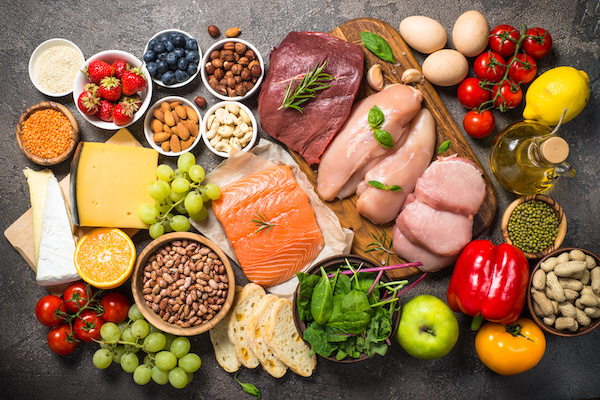 New Brunswick, N.J., March 1, 2023 – There is no single food that will prevent cancer, and no single food will cause it, but a healthy diet and lifestyle can play a large role in lowering your risk of some of the most common cancers. In addition to reducing the risk of developing cancer, the risk of developing heart disease, hypertension, obesity, diabetes, and other chronic diseases might also be prevented by making small changes to your diet. Tracy Meissner, RD, registered dietitian/clinical nutritionist at Rutgers Cancer Institute of New Jersey, shares more.
New Brunswick, N.J., March 1, 2023 – There is no single food that will prevent cancer, and no single food will cause it, but a healthy diet and lifestyle can play a large role in lowering your risk of some of the most common cancers. In addition to reducing the risk of developing cancer, the risk of developing heart disease, hypertension, obesity, diabetes, and other chronic diseases might also be prevented by making small changes to your diet. Tracy Meissner, RD, registered dietitian/clinical nutritionist at Rutgers Cancer Institute of New Jersey, shares more.
Choose a variety of fruits and veggies. All fruits and vegetables contain vitamins, minerals and other nutrients that may help prevent cancer and other chronic illnesses. Aim to eat a variety of different colored fruit and vegetables daily. Fill half of your plate with fruits and vegetables at meals. The American cancer society offers tips on how to add plenty of fruits and veggies into your diet.
Swap white flour products for nutritious whole grains. Whole grains are high in fiber, which can help you stay lean and lower your cancer risk. Try whole wheat bread or different types of grains, like quinoa, tabbouleh, bulgur and faro to find new favorites.
Limit red meat. Red meat includes beef, veal, pork, lamb, mutton, goat and horsemeat. High intake of red meat can increase your risk of different cancers and other chronic diseases. Limiting high fat red meat is recommended as part of a healthy diet. The American Institute for Cancer Research recommends limiting red met to no more than 12-18 ounces per week.
Avoid processed meats. Processed meats include hot dogs, ham, corned beef, beef jerky and certain deli meats. These are classified as carcinogenic to humans by the World Health Organization and have been shown to increase cancer risk. It is best to avoid processed meats as often as possible. Choose fresh chicken, turkey, fish, beans, lentils, nuts and soy instead.
Limit consumption of sugar sweetened beverages such as soda, sports drinks and juices. These drinks can be a cause of weight gain and obesity in both children and adults, especially when consumed frequently or in large portions, which can contribute to the development of cancers and other diseases.
Avoid alcohol consumption. Alcohol is a known carcinogen and increases the risk of cancers of the female breast, liver, colon, rectum, mouth, pharynx, larynx, and esophagus. Avoiding alcohol is recommended by the American Cancer Society Guideline for Diet and Physical Activity. If you do drink, limit alcohol to no more than one drink per day for women or two drinks per day for men.
Be physically active. Aim for 150-300 minutes of moderate intensity or 75-150 minutes of high intensity exercise each week.
Fuel your body for the fight. A well-balanced diet coupled with regular physical activity is vital for those going through cancer treatment. Procedures and medications can cause many individuals to lose their appetite and energy. This puts patients at an increased risk for malnutrition. It is important to try to make food choices that provide you enough calories, protein, vitamins, minerals and fluids.
Click here for additional resources on nutrition for cancer patients
As the state’s leading cancer program and NCI-designated Comprehensive Cancer Center, part of a patient’s care at Rutgers Cancer Institute together with RWJBarnabas Health includes professional support from a clinical dietitian/nutritionist.
###
For journalists – contact:
Krista Didzbalis
Media Relations Assistant
732-507-8307
krista.didzbalis@rutgers.edu
For patient appointments/inquiries – contact:
844-CANCERNJ (844-226-2376)

